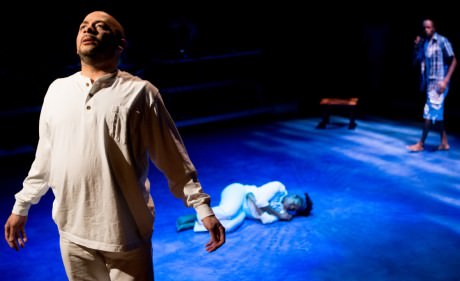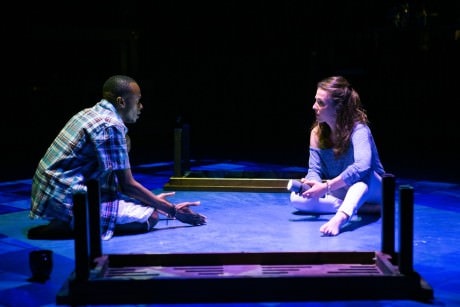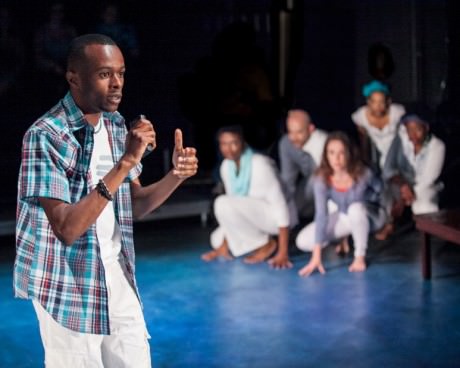A bright 18-year-old named Dontrell has had a dream. He saw a man with the face of his father who is captive on a slave ship crossing the Atlantic. In the dark hold of the vessel he saw that man and a woman conceive a child, from whom Dontrell would one day be descended. And then he saw the man leap overboard into the sea. When Dontrell awakens, he vows to pull that man up to shore.

That simple event impels the transcendent Dontrell, Who Kissed the Sea. As imagined in what follows by Playwright Nathan Alan Davis, the quest to know who one is by knowing where one came from—the yearning to embrace and be embraced by one’s ancestry, to be worthy of it, to redeem it—has perhaps never before in dramatic literature found such lyrical metaphorical force.
The play is so good, it’s getting a National New Play Network Rolling World Premiere in five cities including DC, where Theater Alliance has mounted a production directed by Timothy Douglas that is breathtakingly exquisite. Scenes of choreographed ritual flow into sharply observed naturalistic interludes then flow into dazzling dance and music then flow into astonishing mimed storytelling and back again. Contemporary idiomatic language full of humor flows into heightened poetic arias full of longing then flows into monologues full of intimate disclosure and back again. Stunning stage pictures take us from living rooms and bedrooms to underwater and out to sea.
The part of Dontrell is played by Justin Weaks, whose performance is extraordinary. There is not a split second that Dontrell’s passions and aspirations do not shine through him from within. The character is whip-smart; Dontrell has been accepted into Johns Hopkins and is due there in three weeks. The character is also a poet; he keeps a log about his quest on a mini-cassette recorder in exuberant imagery. The character is also a typical teenager, impetuous and naive. Weaks’s portrayal melds the parts of Dontrell into a transfixing singular presence that propels the action through all its stylistic shifts and diction switching not only with believability and continuity but with star quality.
The cast is abundant with talent: Sharisse Taylor plays Danielle, Dontrell’s endearingly bratty kid sister. Louis E. Davis is Robby, Dontrell’s hip-hopped-up buddy from childhood. Katherine Renee Turner plays Dontrell’s level-headed cousin Shea, who works at an aquarium, where Dontrell consults her about his quest.

Danielle C. Hutchinson is Dontrell’s Mom, the solid rock of the family, who dreads that Dontrell’s deep-sea-diving dreams will deter him from college. Frank Britton portrays Dontrell’s Dad, at first a brusque absence, later a wise guide. Katie Ryan plays Erika, who’s white, three years older, and a lifeguard. Erika saves Dontrell’s life when he jumps into a swimming pool without a clue how to swim. Later they fall in love without a clue where it will lead.
At times the cast appears as an ensemble speaking incantatory text and dancing to the African drum beat of Percussionist Jabari Exum, original music by Matthew M. Nielson, and African-inspired moves by Choreographer Dane Figueroa Edidi. Costume Designer Kendra Rai dresses the Company in ritual white when they’re a chorus and in cleverly contemporary outfits when they play their characters.
Spectacularly dramatic effects have been achieved by Lighting Designer Dan Covey, Projections Designer Michael Redman, and Sound Designer Matthew M. Nielson. In the scene when Dontrell visits the aquarium where his cousin works, the “tank” is formed by a wondrous projection on the floor animated with swimming fish. Upon it Katie Ryan “swims” while Dontrell—in a witty reversal of his own dilemma—talks to her as if she’s Nemo, the clownfish in the Disney cartoon whose father was trying to find her son. When Dontrell jumps into the deep end of a pool thinking he’ll learn to swim (he doesn’t; he nearly drowns), the scene comes vividly alive as chorus members lower and raise a rope around the stage edge to indicate the pool rim and lighting and sound switch from above water to below.
I admired everything about this production, so much so that I felt intimidated reviewing it. As soon as it was over I doubted I could convey just how important and thrilling it was. There was a quality of the script that snuck up on me, though; I didn’t glimpse it till afterward. It has to do with how Davis has drawn Dontrell’s relationships with the women in Dontrell’s life: his cousin Shea, the first trusted person he turns to for advice; Erika, the lifeguard who saves his life; and his mother, whose strength he needs to learn.
There comes a point in the play when Dontrell and his mother have a confrontation. Dontrell has obtained scuba gear to pursue what he calls his destiny, to rescue his long-drowned ancestor. His mother, angry that Dontrell would not honor his duty and go to college, grabs the knife from a birthday cake and stabs the wetsuit with it.
MOM (stabbing): You think your dreams the only ones the matter!?
DONTRELL: Ma, stop it!
MOM (stabbing): What you think you know about destiny!? I put my everything into you boy!
DONTRELL: Ma, stop it! Stop it! Stop it you bitch!
Abruptly there is silence. Everyone freezes.
What comes next in Davis’s script is a passage during which Dontrell’s Dad, till now not much of a presence, gives Dontrell a serious dressing down about what it meant that he called his mother “bitch.” In that monologue—which Frank Britton delivers with staggering power (walking away with the scene)—Dontrell’s father explains:
Bitches is Warrior-Women, but we don’t know how to call ’em that, and we ain’t got no other word for ’em….
Mothers are always on guard….
Mamma knows she the last line of defense….
When you in your darkest hour and them wolves come howlin’
I don’t want no pound puppies at the gate. I don’t want no best in show.
I want Bitches.
I want Ruthless Bitches.
I want Meeean Bitches protecting you….
I want Warrior Women standin’ over you!…
You go out there and kiss your mother.
Dontrell, who has yet to kiss the sea, goes to do so.

Dontrell, Who Kissed the Sea breaks over us like wave upon wave of human love and hope, submerges us in honesty, buoys us by its bold vision and heartfelt voice. This gorgeous Theater Alliance production of this beautiful new play is an absolute must.
Running Time: 90 minutes, with no intermission.
Dontrell, Who Kissed the Sea plays through May 31, 2015 at Theater Alliance playing at the Anacostia Playhouse – 2020 Shannon Place SE, in Washington, DC. Purchase tickets online.






An amazingly perceptive and thorough review. Reminds me of those broadcast by my teacher and mentor, the late Davy Marlin-Jones. Davy could tell you more about a play in two minutes than most people could in an hour.